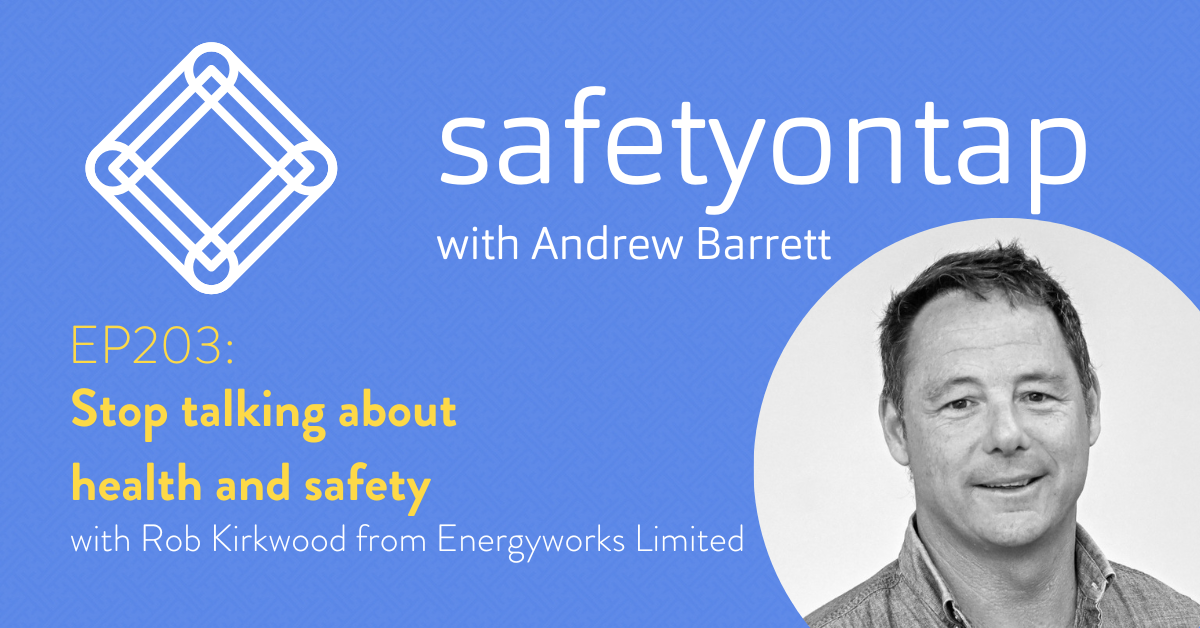Why on earth would you remove the words health and safety, in order to improve health and safety?
Hey, it’s Andrew, and this is Safety on Tap.
Since you’re listening in, you must be a leader wanting to grow yourself and drastically improve health and safety along the way. Welcome to you, you’re in the right place. If this is your first time listening in, thanks for joining us and well done for trying something different to improve! And of course welcome back to all of you wonderful regular listeners.
My guest today is Rob Kirkwood. Rob is a health and safety professional with some pretty cool work experiences including as an alpine guide, industrial abseiler, a fisheries ranger and spent a few years working in Antarctica.
But what I think is most cool about Rob’s work, is that he’s figuring out how to improve health and safety by removing those words from his company’s vocabulary. How’s that make sense, I hear you wonder? Well, Rob will fill you in, but it starts with his realisation that there was just too much bad stuff associated with the words health and safety, and on the flip side a huge opportunity to refocus his leaders and people on organisational performance.
Here’s Rob:
You’ve probably heard me talk about learning teams, and might be wondering what’s that all about. Learning teams are an increasingly popular practical activity to help your organisation to learn better, in order to improve performance.
It’s not an investigation, its not a risk assessment, and its not a committee meeting – but a learning team approach can help to learn from the past, to anticipate the future, and to engage effectively with people all over your organisation or supply chain.
There’s not one way to do learning teams but some critical principles which will enable you to facilitate better learning whatever your situation.
I’ve created a few short videos which explain What is a learning team? If you’re interested visit safetyontap.com/what
Here’s my three takeaways from that chat with Rob Kirkwood:
Takeaway #1: There’s two storylines in this interview. One is about trying new stuff to replace, as Rob said, the ‘dumb sh*t’, guided by ideas from Human and Organisational Performance. But the other storyline here, is about change. Every story has multiple storylines. Just because you pick one up storyline first, doesn’t mean you have the whole story. Rob’s past few years are as much a story about patient and adaptive change as they are about the new view of safety.
Takeaway #2: With that in mind, let’s focus on what we can learn from the way Rob approached change. Notice how patient he was by helping key people, like his business owner and senior leaders, understand how the current state was problematic. This patience continued by looking for, or waiting for, opportunities for people to open their minds to new ways of seeing the world, as well as new language to get familiar with. Rob always knew it was a good idea, but his approach to change wasn’t to tell and shove that into the organisation, but to create the conditions to help others understand, at their own pace, as he said, “one conversation at a time”.
Takeaway #3: There is rarely a step by step process to follow in our line of work which is proportionately far more adaptive than technical. We are not technicians installing a machine, nor doctors performing a common surgical procedure. We can only approach change with an rough idea of the steps to take, and at each step pause to ask ourselves, ‘now we know that little bit more about what is happening, what do we do next?’. Rob has been successful precisely because he didn’t wait for, or pretend to be able to come up with, the whole step by step process.
A few other episodes you may want to check out, which pick up some of the threads of this conversation, are Ep 188 with Kym Bancroft sharing a case study of organisation-wide change, in Ep183 I share more of the story of the flat earth/round earth conundrum when engaging with your stakeholders, Ep92 helps you reflect on the question of What’s it For, which is especially relevant when we start to question the things we do and say in the name of health and safety, and finally Ep 162 with Adam Johns dove deep into why our language matters, which helps make sense of why Rob wanted to remove the words health and safety in the first place.
Thanks so much for listening. Until next time, what’s the one thing you’ll do to take positive, effective or rewarding action, to grow yourself, and drastically improve health and safety along the way?
Seeya!

